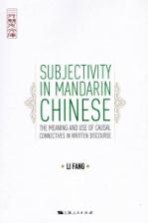图书介绍
汉语因果关系连词的主观性研究pdf电子书版本下载

- 李芳著 著
- 出版社: 上海:上海人民出版社
- ISBN:9787208148222
- 出版时间:2017
- 标注页数:293页
- 文件大小:47MB
- 文件页数:301页
- 主题词:汉语-连词-研究
PDF下载
下载说明
汉语因果关系连词的主观性研究PDF格式电子书版下载
下载的文件为RAR压缩包。需要使用解压软件进行解压得到PDF格式图书。建议使用BT下载工具Free Download Manager进行下载,简称FDM(免费,没有广告,支持多平台)。本站资源全部打包为BT种子。所以需要使用专业的BT下载软件进行下载。如 BitComet qBittorrent uTorrent等BT下载工具。迅雷目前由于本站不是热门资源。不推荐使用!后期资源热门了。安装了迅雷也可以迅雷进行下载!
(文件页数 要大于 标注页数,上中下等多册电子书除外)
注意:本站所有压缩包均有解压码: 点击下载压缩包解压工具
图书目录
CHAPTER 1 Introduction 1
1.1 The notion of subjectivity in language 1
1.2 Research questions 5
1.3 The scope of causality to be covered 11
1.3.1 Thegeneral viewof causality andXing's(2001)taxonomicalwork 12
1.3.2 Other major taxonomies of Chinese causal complex sentences 15
1.3.3 The scope of causality to be dealt with in this book 23
1.4 The range of Chinese causal connectives to be studied 28
1.5 Structure ofthe book 31
CHAPTER 2 The relevance of subj ectivity for the characterization of Mandarin causal connectives:A literature review 31
2.1 Introduction 35
2.2 Review of the literature on subjectivity in Mandarin Chinese 36
2.2.1 Method and research questions 37
2.2.2 Chinese linguists'views of subjectivity 38
2.2.3 Linguistic features used to determine the degree of subjectivity 40
2.3 Review of the literature on Chinese causal connectives 44
2.3.1 Method and research questions 45
2.3.2 The analytical categories and their relevance to subjectivity 45
2.4 Objects,methods and genre 60
2.4.1 Objects of study 62
2.4.2 Methods 64
2.4.3 Genre 67
2.5 General discussion and conclusion 69
2.5.1 The relevance of subjectivity to the usage patterns of Chinese causal connectives 69
2.5.2 Refining existing approaches to the issue of subjectivity in causal connectives 70
2.5.3 Genre as an independent factor 72
2.5.4 A multi-angle approach:connectives,language use and cognition 72
CHAPTER 3 Subjectivity and result marking in Mandarin:A corpus-based investigation 75
3.1 Introduction 75
3.2 Subjectivity defined 83
3.3 Corpus-based analysis 87
3.3.1 Mandarin result connectives 87
3.3.2 Corpus and sampling method 89
3.3.3 Analysis 92
3.4 Results 101
3.4.1 Domain 101
3.4.2 Propositional attitude 104
3.4.3 The presence of SoC 107
3.4.4 The identity of SoC 109
3.5 Discussion 112
3.5.1 Subjectivity profiles identified 112
3.5.2 Genre-sensitivity:semantics vs.pragmatics 114
3.5.3 Speaker economy 116
3.5.4 Remarks on the analytical model 116
3.6 Conclusion 118
CHAPTER 4 On the subjectivity of Mandarin r eason connectives:Robust prof les or genre-sensitivity 122
4.1 Introduction 122
4.2 Method 131
4.2.1 Corpora 131
4.2.2 Analysis 132
4.3 Results 140
4.3.1 Domain 140
4.3.2 Propositional attitude 143
4.3.3 The presence of SoC 144
4.3.4 The identity of SoC 146
4.3.5 Sentence-initial vs.inter-sentential yinwei 148
4.4 Discussion and conclusion 150
CHAPTER 5 On the online effects of subjectivity information encoded in causal connectives 156
5.1 Introduction 156
5.1.1 Causal coherence relations and subjectivity 156
5.1.2 Causal connectives and subjectivity in discourse processing 158
5.2 The causal connectives to be studied and predictions 168
5.2.1 Kejian,suoyi and yin'er 168
5.2.2 Predictions 170
5.3 Method 172
5.3.1 Participants 172
5.3.2 Materials and design 173
5.3.3 Procedure 176
5.3.4 Analysis 177
5.4 Results 179
5.4.1 First pass reading 180
5.4.2 Total fixation duration 182
5.5 Discussion 183
CHAPTER 6 General discussion and conclusion 192
6.1 Assessing the relevance of subjectivity for the characterization of causal connectives in Chinese 192
6.2 Subjectivity profiles identified,genre-sensitivity,and language-specific properties 196
6.2.1 Six stable subjectivity profiles 198
6.2.2 The issue of genre-sensitivity 202
6.2.3 Language-specific properties 205
6.3 The impacts of subjective,objective and underspecified causal connectives on discourse processing 206
6.4 Discussion and topics for future research 214
6.4.1 Variation in connective use:scalar view or categorical perspective? 214
6.4.2 Subjectivity and correlatively used causal connectives 219
6.4.3 Cognitive processes associated with subjectivity 221
6.5 Conclusion 226
REFERENCES 228
APPENDICES 248
ACKNOWLEDGEMENTS 291